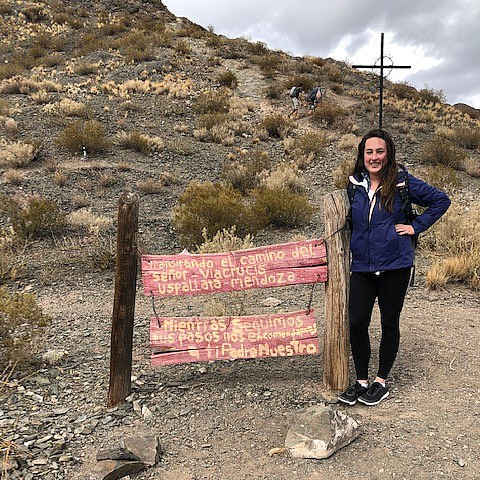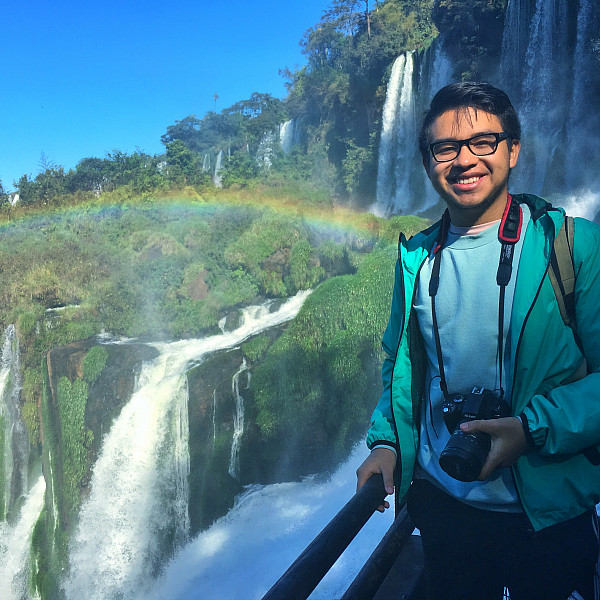News
Innocents Abroad
August 08, 2019
August 08, 2019

When we travel, we tend to romanticize our destination and the adventures we’ll encounter while there. We have notions of who we will be in this new place, reborn in a state of wanderlust that carries our imaginations further than our feet ever could. But what happens when our idyllic study-abroad experience collides with reality? What do we do when our cozy accommodations, our meticulously planned itineraries, or the seemingly limitless bounds of our checking accounts don’t pan out the way we imagined? What follows are the stories of Southwestern students and staff who have experienced the joys of traveling while also enduring the growing pains associated with a few inevitable misadventures along the way.
“Time waits for no one”
The U.S. is characterized by what some call a monochronic culture. That is, because minutes are money and both punctuality and deadlines are accorded great significance in the States, American travelers sometimes have to adjust to the much more relaxed, flexible approach to time that distinguishes polychronic cultures.
Tisha Korkuś, Southwestern’s director of intercultural learning, studied abroad in Argentina while she was in high school. She knew very little about the language—and even less about the culture—when she first arrived. Recalling her time in South America, she notes, “While I soon learned quite a bit of the language and culture, one concept continued to elude me: the Argentine concept of time.” As an American, she was accustomed to meetings starting on time and associating tardiness with rudeness; however, in Argentina, everyone arrives fashionably late. “The fact that my Argentine friends would continuously show up late to events even when I made absolutely sure that I understood what time we were to meet—and reiterated the time several times with them—was just maddening to me,” remembers Korkuś. “My Argentine boyfriend was the worst offender. No matter how late I showed up, he was always later.”
Fed up with perpetually having to wait for others, Korkuś made plans one day to meet her boyfriend at a café and went to great lengths to show up late. “I stopped in stores along the route, talked with people I knew, and did my best to waste as much time as I could,” she recalls. By the time she got to the café, she was 45 minutes late and feeling rather satisfied with her delayed arrival.
“I walked inside, expecting to see my boyfriend sitting at a table, waiting for me for once,” she says. “But, no. No boyfriend. Wouldn’t you know that the stinker walked in just a minute or two after I’d arrived?” Following her foiled attempt at lateness, Korkuś resigned herself to being the first to arrive. While she may not have mastered the mysteries of the Argentine clock, Korkuś did, at least, learn that sometimes, relaxing, people-watching, and otherwise killing time are valuable ways to spend one’s minutes—if not hours.
Turbulence of the abdominal kind
Travel dilettantes and connoisseurs alike can—and, perhaps unfortunately, will—tell you that when touring a new city or new country, the human body is not always fit to endure whatever itinerary the mind has set forth. Individuals who have vacationed, studied, or worked abroad have shared tales of recovering from broken bones, seasickness, inexplicable skin rashes, and stomach flu while traveling.

Not knowing what was happening to her, Gregovic stood up and started pacing up and down the aisle in an attempt to stop the pain. Eventually, she recalls, “The flight attendant noticed me and asked what was wrong, but as I was just as confused as she was, all I could do was shrug. She ran to get me a hot water bottle, but by the time she got back, I had worsened further—I couldn’t stand and was lying on the ground throwing up. I think we both thought I was about to die,” describes Gregovic.
Unsurprisingly, a coed writhing in pain on the floor of an airplane had drawn the attention of other passengers. Luckily, the flight attendant managed to shoo them away and identify a few medical professionals that were aboard. Gregovic’s impromptu medical team narrowed down the locus of her pain to either her kidney or gallbladder, which was enough cause for the pilots to make an emergency landing.
After touching down in Indianapolis, an ambulance arrived to take Gregovic to the hospital. She remembers that “when the ER people came onboard to wheel me off in a stretcher, the pilot loudly announced over the speaker, ‘the patient does not give you permission to Snapchat her,’ which I thought was pretty funny, even in my state.” Once at the hospital, Gregovic was diagnosed with kidney stones, given medication, and deemed able to travel to New York within the next few days. She looks back on the situation with a smile. “Like I said, not exactly the traditional start to the semester,” she says. “But now I can tell people I got a plane rerouted because of me, which is a great fun fact.”
Did You Know?
- 42% of the American population own a passport.
- Mexico is the most popular destination for American tourism, Canada is the second, and Britain is the third.
- 38.33 million Americans traveled abroad in 2017.
- Over the last 13 years, an average of 827 Americans died of unnatural causes while abroad each year.
- In the 2016–2017 academic year, 332,727 American students studied abroad for academic credit.
- A 2015 study found that 19% of Americans have never flown on an airplane.
A tale of culinary woe
Getting to sample authentic cuisine is usually one of the highlights of any trip abroad. Whether it’s higos con queso (figs and cheese) in Ecuador, hong shao niu rou mian (beef noodle soup) in Taiwan, or maharagwe (spiced red beans in coconut milk) in Kenya, food is just one entrée into a region’s culture and history, including its traditions, taboos, agriculture, and trade. We expect the cuisine to differ from what we’re accustomed to, and we hope that travel will expand our minds and stomachs alike—though that’s not always the case.
Sarah Brackmann, senior director of integrative and community-engaged learning, traveled outside the U.S. for the first time while studying abroad in London as part of her master’s program in higher education and student affairs. “As you probably know, the food in England is not the greatest,” she opines. Brackmann recalls that she and a fellow student were “craving good food, [so] we decided to treat ourselves by eating at a quaint cafe. We felt really sophisticated and wanted good homemade food, so we ordered baked ravioli. We apparently forgot we were in England and not Italy because we expected fresh pasta with delicious sauce.”
Unfortunately, what arrived on the plate did not fulfill the expectations set up by the menu. “Instead,” says Brackmann, “they served us Chef Boyardee with cracker crumbs.” To make matters worse, the canned ravioli had expired and was covered in mold, rendering it inedible. “Lesson learned,” notes Brackmann, “I survived on digestives and pasties for the rest of the visit.”

Running out of gas on a mountain road. Being trapped in an airport for eight hours after a delay causes a missed connection. Gripping the armrest in the backseat of a taxi that’s being steered by a driver who apparently has an appointment with death. They’re all examples of the kinds of transportation mishaps that can reduce a weary traveler to tears. But learning how to navigate air and ground transportation in a foreign country is also the kind of experience that can teach creative problem-solving and resilience.
For a month last summer, Sarah Barton ’20 studied wildlife management at the School for Field Studies in Tanzania. While on safari in the Serengeti, one of the Jeeps got a flat tire. “This was funny because we were in the middle of nowhere, where you least want to get a flat tire,” Barton explains. After all, unlike getting a flat tire while driving down I-35, when you are surrounded by grasslands full of wildlife and are at the mercy of Mother Nature, there is no AAA that you can call for help.
Barton obviously lived to tell the tale … only to experience even more car trouble. During another expedition, her group’s Jeep got stuck in a ditch along the trail. Barton recalls, “Everyone had to get out of the car so we could lighten the weight and try to get it out of the ditch.” As the travelers contemplated being once again stranded in the wild, a rather grisly fate befell one of Barton’s fellow students while waiting for the vehicle to be freed from the ditch: “One girl that was in the Jeep accidentally stepped in a pile of poop that was on the road.” Luckily, the incident served as a much-needed break in the tension caused by their car troubles. “This was one thing that we had a good laugh at,” says Barton.
While traveling abroad, we often reach new highs and lows and humble ourselves through our failures. However, learning how to adapt to the unfamiliar and cope with discomfort—from culture shocks and health scares to unpalatable cuisine and unreliable transportation—is still key to developing greater self-awareness and encouraging personal growth. And learning how to laugh at ourselves through it all never hurts, either.
Do you have a humorous memory to share from your travels abroad? Send an email, voice recording, or video to magazine@southwestern.edu and tell us all about it.



















